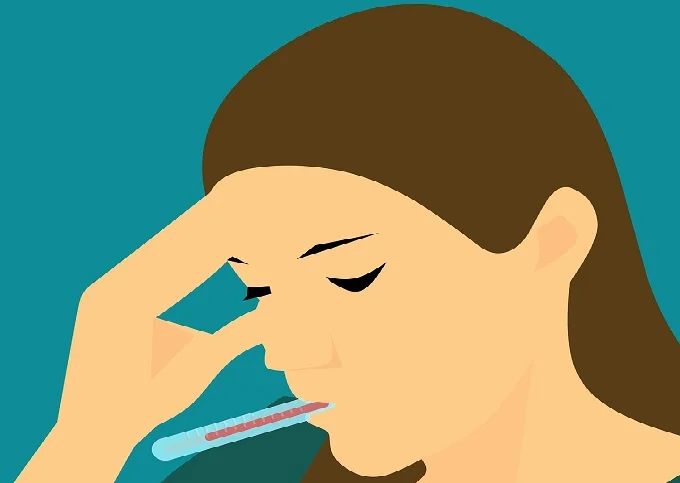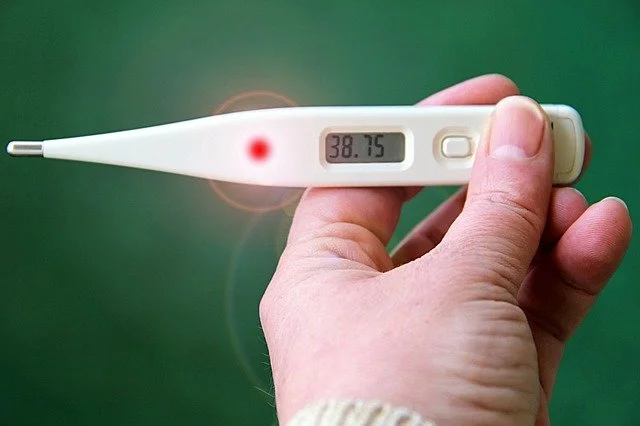High body temperature in adults and what to do?

It is not unusual to have a high body temperature. It typically terrifies us, and we either seek medical assistance or do everything we can to minimize it on our own. Up to a certain point, a high temperature in an adult is not life-threatening, and you should not hurry to reduce it.
On the contrary, a rise in temperature may signal that the immune system is working properly, which is excellent news. So, how can you know when this rise is excessively worrisome and when it isn’t? Afrinik informs its readers on when the temperature may increase, why it does, and when and how it can be lowered.
High bodu temperature causes
A high fever in a young kid is considerably more hazardous than a high temperature in an adult since a baby’s immune system is still developing and cannot respond properly to any environmental stimuli. When it comes to high temperatures in adults, things are a little different. Because the immune system of an adult has a well-established method of operation, it is able to regulate all processes in the body and ‘switch on’ specific indications of its condition in response to changes in the body.
What causes a high temperature in an adult? This is due to a variety of factors. The body’s temperature may increase as a result of bacterial and viral infections, allergies, inflammatory processes in tissues and joints, natural hormones, heart attacks, hemorrhage, and other factors.
In any event, a high temperature is not a sickness in and of itself, but rather an indication of the immune system’s response to a problem.
In general, physicians consider a rise in body temperature to be a positive indicator of the body’s capacity to resist the damaging effects of certain aggressive forces. High temperatures kill many viruses and prevent them from completely replicating and speed up the production of interferon, which boosts our immune system.
A high temperature is an indication of excellent adult health potential when the immune system is working normally. If there is obvious evidence of a weakened immune system as a result of age, medicines, surgeries, chemotherapy treatment, and other factors, a temperature rise should already be regarded unusual.
In other instances, a high fever that just surpassed 38 degrees Celsius isn’t enough to warrant a doctor’s visit. When the body temperature exceeds 39.5 degrees Celsius, it should be called. If its fever rises to 41 degrees Celsius, she should seek medical assistance right once since convulsions may occur at this temperature. And once the mercury column on the thermometer reaches the crucial number of 42, permanent damage to brain processes happens rapidly, making physicians’ presence a matter of life and death. Adults, on the other hand, seldom attain this temperature. In any event, this isn’t typically the case when it comes to infectious illnesses.

how to get a high fever down to a comfortable level
Of doubt, high temperatures are difficult to bear; nevertheless, as we have seen, they should only be reduced in severe circumstances. How can a high temperature be brought down in the simplest manner possible? It would help if you attempted to calm down before taking any antipyretic medication.
To begin, drink as many fluids as possible; as the temperature increases, the quantity of liquid in the body drops dramatically, resulting in dehydration. As a result of the dehydration, the temperature rises even further. You may drink anything you like, including juices, mineral water, and tea, as long as it helps to restore the body’s water balance as much as possible. In this case, a hot tea or fruit drink with honey, lemon, raspberries, and currants is ideal when a sick person’s fever begins to drop after drinking, sweat forms on his or her forehead.
This, however, is insufficient to keep the mercury column from rising again after a time. In this instance, the patient may be massaged with vodka, alcohol, or fragrance after being fully naked and not covered with a blanket or clothed for some time. Of course, he’ll freeze, but you shouldn’t be concerned. This technique of decreasing the temperature is extremely efficient and totally safe, and it has been employed for a long time in many clinics.
An enema packed with a solution of antipyretic powder and half a glass of boiling water is another effective method to decrease the temperature. This technique is uncomfortable, but it is the best and quickest approach to lower a high fever that has been present for a long period.
When it comes to antipyretic medications, you should only use them if absolutely essential. The options are now very diverse, although paracetamol, aspirin, and ibuprofen are the most well-known and often used. These pills should be used with caution since they may exacerbate blood clotting and, in rare instances, cause bleeding. Furthermore, aspirin should not be taken by those with digestive system problems since it irritates the mucous membrane and may worsen.
A comprehensive evaluation by experts will be needed if the high temperature lasts for three days over 38°C and is not accompanied by a cough, runny nose, sore throat, or other obvious signs of the illness. This condition may be caused by pneumonia, pyelonephritis, or another severe illness that requires antibiotic therapy.




